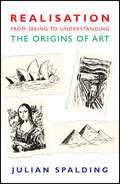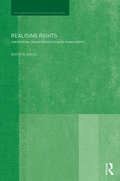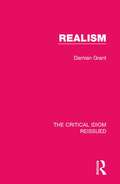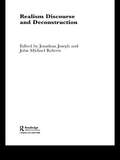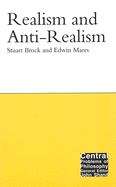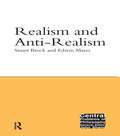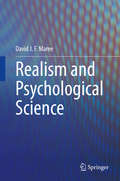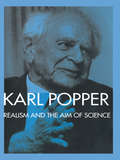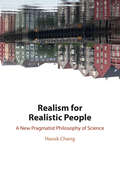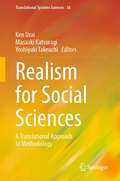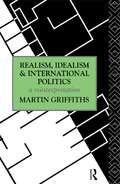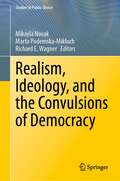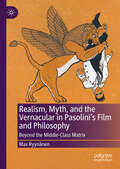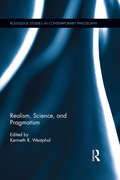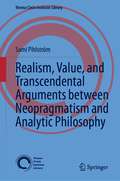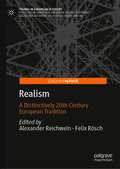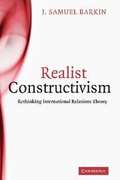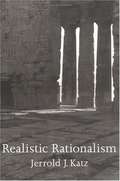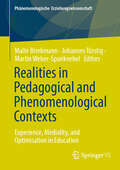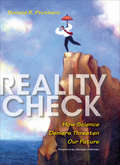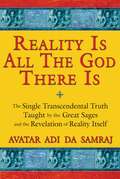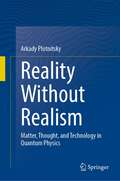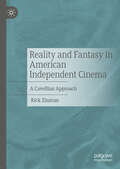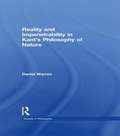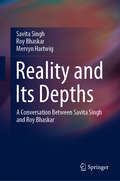- Table View
- List View
Realisation-from Seeing to Understanding
by Julian SpaldingOur world view has changed from a flat earth under the dome of heaven to a planet spinning in the universe. We perceived the world as a body, like ours, then as a tree, a pyramid, an altar, and finally as a veil which became a window through which we peered only to discover ourselves on a sphere, a bubble which might burst at any moment. Our changing views are interpreted through iconic images of the remote and more recent past: the Venus of Willendorf, the Pyramids, Stonehenge, the Taj Mahal, the Scream, Sydney Opera House, and the Guggenheim, Bilbao.
Realising Rights: How Regional Organisations Socialise Human Rights (Routledge Studies in Globalisation)
by Mathew DaviesThis book presents the hitherto unstudied variety of ways that human rights socialisation is attempted in the context of regional organisations, arguing that existing conceptual accounts of this phenomenon need to be expanded to best explain this diversity. By placing the study of the European Union’s relationship with Turkey alongside parallel studies of the Association of Southeast Asian Nations engagement with Myanmar, and the Organization of American States history with Panama, this book argues that rights socialisation efforts are far more diverse than previously thought. Alongside the conditionality that dominates the EU experience, and that has received the majority of existing academic attention, this book argues that both the politics of social influence, the strategic manipulation of legitimacy and the politics of debate over the meaning of membership also drive socialisation efforts. This book situates these socialisation efforts along the journey states take when applying to, joining and then maintaining membership of, a regional organisation, and further distinguishes between what conditions are necessary for socialisation to be attempted and what further requirements are needed for that attempt to be successful. To appreciate the diversity of socialisation politics revealed, this book constructs an inclusive conceptual framework drawing on both rational choice and constructivist theorising and will be of interest to students of Politics and International Relations.
Realism (The Critical Idiom Reissued #8)
by Damian GrantFirst published in 1970, this book provides an introduction to literary realism. After considering what realism is and its philosophical roots, it goes on to examine the emergence of the idea of realism in nineteenth-century France and its gradual spread across the wider republic of letters. This work will be of interest to those studying nineteenth-century European literature.
Realism Discourse and Deconstruction (Routledge Studies in Critical Realism)
by Jonathan Joseph John Michael RobertsTheories of discourse bring to realism new ideas about how knowledge develops and how representations of reality are influenced. We gain an understanding of the conceptual aspect of social life and the processes by which meaning is produced. This collection reflects the growing interest realist critics have shown towards forms of discourse theory and deconstruction. The diverse range of contributions address such issues as the work of Derrida and deconstruction, discourse theory, Eurocentrism and poststructuralism. What unites all of the contributions is a sense that it is essential to provide a realist alternative to the hitherto dominance of social constructionism, hermeneutics and postmodernism, over many of the issues discussed. By developing a realist perspective the different authors attempt to embed discourse within the structured nature of the reality of the world. Realism can situate language, discourse and ideology within context specific, or 'causally efficacious' circumstances. Realism can help to uncover issues of power, representation, and subjectivity and how discursive and other social practices produce real effects. This can help us understand the manner in which (non-discursive) social structures are reproduced through various forms of ideology and discourse. And by knowing this, we can start to address questions concerning human emancipation and how the world is to be transformed.
Realism and Anti-Realism (Central Problems of Philosophy #14)
by Stuart Brock Edwin MaresStuart Brock and Edwin Mares offer a clear introduction to different realist and anti-realist positions and arguments in five key domains - science, ethics, mathematics, modality, and fictional objects. Realism and Anti-Realism focuses on the core concept of realism, taking the perspective that, for each domain considered, there are facts or entities distinctive to that domain whose existence and nature is in some important sense objective and mind-independent. For each of the five areas the authors examine the various styles of argument in support of and against realism and anti-realism, showing how different positions and arguments arise, evaluating their success, and drawing some general conclusions about the assorted strategies. They provide in-depth explorations of error theory, fictionalism, non-cognitivism, relativism, and response-dependence, which they consider to be the most important positions in opposition to realism.
Realism and Anti-Realism (Central Problems of Philosophy #14)
by Stuart Brock Edwin MaresThere are a bewildering variety of ways the terms "realism" and "anti-realism" have been used in philosophy and furthermore the different uses of these terms are only loosely connected with one another. Rather than give a piecemeal map of this very diverse landscape, the authors focus on what they see as the core concept: realism about a particular domain is the view that there are facts or entities distinctive of that domain, and their existence and nature is in some important sense objective and mind-independent. The authors carefully set out and explain the different realist and anti-realist positions and arguments that occur in five key domains: science, ethics, mathematics, modality and fictional objects. For each area the authors examine the various styles of argument in support of and against realism and anti-realism, show how these different positions and arguments arise in very different domains, evaluate their success within these fields, and draw general conclusions about these assorted strategies. Error theory, fictionalism, non-cognitivism, relativism and response-dependence are taken as the most important positions in opposition to the realist and these are explored in depth. Suitable for advanced level undergraduates, the book offers readers a clear introduction to a subject central to much contemporary work in metaphysics, epistemology and philosophy of language.
Realism and Psychological Science
by David J. MareeThe book provides an argument why realism is a viable metatheoretical framework for psychological science. By looking at some variations of realism such as scientific realism, critical realism, situational realism and Ferraris’ new realism, a realist view of science is outlined that can feature as a metatheory for psychological science. Realism is a necessary correction for the mythical image of science responsible for and maintained by a number of dichotomies and polarities in psychology. Thus, the quantitative-qualitative dichotomy, scientist-practitioner polarity and positivist-constructionist opposition feed off and maintains a mythic image of science on levels of practice, methods and metatheory. Realism makes a clear distinction between ontology and epistemic access to reality, the latter which easily fits with softer versions of constructionism, and the former which grounds science in resistance and possibility, loosely translated as criticism. By taking science as a critical activity an issue such as the quantitative imperative looses its defining force as a hallmark of science - it provides epistemic access to certain parts of reality. In addition, essentially critical activities characteristic of various qualitative approaches may be welcomed as proper science. Academics, professionals and researchers in psychology would find value in situating their scholarly work in a realist metatheory avoiding the pitfalls of traditional methodologies and theories.
Realism and the Aim of Science: From the Postscript to The Logic of Scientific Discovery
by W. W. Bartley III Karl PopperRealism and the Aim of Science is one of the three volumes of Karl Popper’s Postscript to the Logic of scientific Discovery. The Postscript is the culmination of Popper’s work in the philosophy of physics and a new famous attack on subjectivist approaches to philosophy of science. Realism and the Aim of Science is the first volume of the Postcript. Popper here formulates and explains his non-justificationist theory of knowledge: science aims at true explanatory theories, yet it can never prove, or justify, any theory to be true, not even if is a true theory. Science must continue to question and criticise all its theories, even those that happen to be true. Realism and the Aim of Science presents Popper’s mature statement on scientific knowledge and offers important insights into his thinking on problems of method within science.
Realism for Realistic People: A New Pragmatist Philosophy of Science
by Hasok ChangIn this innovative book, Hasok Chang constructs a philosophy of science for 'realistic people' interested in understanding and promoting the actual practices of inquiry in science and other knowledge-focused areas of life. Inspired by pragmatist philosophy, he reconceives the very notions of reality and truth on the basis of his concept of the 'operational coherence' of epistemic activities, and offers new pragmatist conceptions of truth and reality as operational ideals achievable in actual scientific practice. Rejecting the version of scientific realism that is concerned with claiming that our theories correspond to an ultimate reality, he proposes instead an 'activist realism': a commitment to do all that we can actually do to improve our knowledge of realities. His book will appeal to scholars and students in philosophy, science and the history of science, and all who are concerned about the place of science and empirical truth in society.
Realism for Social Sciences: A Translational Approach to Methodology (Translational Systems Sciences #36)
by Yoshiyuki Takeuchi Ken Urai Masaaki KatsuragiThis book discusses the growing interest in realism in social sciences of the twenty-first century. The first part of this book provides recent discussions on realism in philosophy. The second part describes specific problems that have returned to realism in various fields of the social sciences, such as economics, cultural anthropology, management science, and statistics. This book clarifies what kinds of movements are taking place and consequently the direction in which the social sciences are heading in the future. Readers would also find that there is great diversity in the way realism and reality are perceived and understood, depending on the objectives and circumstances of each field of social science. This suggests that rather than having a unified view (stance) of realism and reality, it may be more meaningful to value the differences, diversity, and range itself. Therefore, this book does not present a unified view of realism, reality, and actuality. Although the definitions of realism and reality may differ from chapter to chapter, this represents a corner of the current state of the social sciences. This book is unique in that it examines how the issues of realism and reality are viewed, understood, and dealt with in the various fields of social science, instead of examining them by philosophers and philosophers of science. This would clarify how philosophical discussions have been translated into the various fields of social science.
Realism, Idealism and International Politics: A Reinterpretation
by Martin GriffithsThis book defends realism in the study of international politics and demonstrates the heuristic and evaluative utility of Robert Berki's interpretation of political realism and political idealism. It argues that realism is not a meaningless term nor redundant and necessarily rhetorical in politics.
Realism, Ideology, and the Convulsions of Democracy (Studies in Public Choice #44)
by Mikayla Novak Richard E. Wagner Marta Podemska-MikluchThis edited volume explores the tension between reason and sentiment in democracies and its contribution to the decline of liberalism. Bringing together classical liberal scholars with a deep knowledge of public choice ideas, the chapters delve into this tension from a variety of perspectives. Building on the principle of entangled political economy, as articulated by Richard E. Wagner, this volume engages with new facets of the relationship between choice and consequence and their implications for democratic politics. Advocating for a reframing of public choice theory as compatible with civic republicanism, this volume will be of interest to students and scholars of public choice, political economy, political theory, governance, and economic policy.
Realism, Myth, and the Vernacular in Pasolini's Film and Philosophy: Beyond the Middle-Class Matrix
by Max RyynänenPier Paolo Pasolini’s lifework has been studied through the lens of queer studies, film studies, poetry, and many other angles, but there are themes that one could still study. This book aims to bring forth a new understanding of Pasolini as someone who worked in various arts, and through appropriating one art with. Max Ryynänen shows Pasolini’s importance for not just film and film theory, but more broadly visual studies, art research and even cultural philosophy – where Pasolini can be seen to be a real pioneer in discussing unprivileged margins in the society. Ryynänen reads Pasolini not just as a semiotician of film, but also as a cultural philosopher, and argues for that interpretation.
Realism, Science, and Pragmatism: Realism, Science, And Pragmatism (Routledge Studies in Contemporary Philosophy)
by Kenneth R. WestphalThis collection of original essays aims to reinvigorate the debate surrounding philosophical realism in relation to philosophy of science, pragmatism, epistemology, and theory of perception. Questions concerning realism are as current and as ancient as philosophy itself; this volume explores relations between different positions designated as ‘realism’ by examining specific cases in point, drawn from a broad range of systematic problems and historical views, from ancient Greek philosophy through the present. The first section examines the context of the project; contributions systematically engage the historical background of philosophical realism, re-examining key works of Aristotle, Descartes, Quine, and others. The following two sections epitomize the central tension within current debates: scientific realism and pragmatism. These contributions address contemporary questions of scientific realism and the reality of the objects of science, and consider whether, how or the extent to which realism and pragmatism are compatible. With an editorial introduction by Kenneth R. Westphal, these fourteen original essays provide wide-ranging, salient insights into the status of realism today.
Realism, Value, and Transcendental Arguments between Neopragmatism and Analytic Philosophy (Vienna Circle Institute Library #7)
by Sami PihlströmThe essays collected in this volume and authored by Sami Pihlström emphasize that our relation to the world we live in and seek to represent and get to know better through our practices of conceptualization and inquiry is irreducibly valuational. There is no way of even approaching, let alone resolving, the philosophical issue of realism without drawing due attention to the ways in which human values are inextricably entangled with even the most purely “factual” projects of inquiry we engage in.This entanglement of the factual and the normative is, as explicitly argued in Chapter 7 but implicitly suggested in all the other chapters as well, both pragmatic (practice-embedded and practice-involving) and transcendental (operating at the level of the necessary conditions for the possibility of our representing and cognizing the world in general). The author claims we need to carefully examine the complex relations of realism, value, and transcendental arguments at the intersection of pragmatism and analytic philosophy. This book does so by offering case-studies of various important neopragmatists and philosophers close to the pragmatist tradition, including Hilary Putnam, Nicholas Rescher, Joseph Margolis, and Ludwig Wittgenstein. It appeals to scholars and advanced graduate students focusing on pragmatism and analytic philosophy.
Realism: A Distinctively 20th Century European Tradition (Trends in European IR Theory)
by Felix Rösch Alexander ReichweinThis book examines how IR’s European realist tradition evolved in Europe and, due to emigration, in the United States in the 20th century. It includes an introduction and eight chapters, focusing on historical classical and contemporary structural branches of realist IR theorizing in historical and political contexts in which realist thinking did develop. It reminds us of realist key figures, such as Edward H. Carr, John H. Herz or Hans J. Morgenthau, but also of almost forgotten realists such as Raymond Aron, Stanley Hoffmann or Nicholas J. Spykman. Given IR mainstream textbooks introducing realism as a conservative American Cold War theory, this selection aims to reintroduce realism as a primarily and distinctively European, liberal, normative and critical tradition. A tradition that is almost always misunderstood as a guide for practitioners how to maximize or at least preserve power in the name of the national interest no matter the cost, but that is in fact an argument against reckless and crude power politics, ideology and totalitarianism. This book is an invaluable resource for scholars, practitioners and students interested in the realist tradition in IR.
Realist Constructivism
by Samuel BarkinRealism and constructivism, two key contemporary theoretical approaches to the study of international relations, are commonly taught as mutually exclusive ways of understanding the subject. Realist Constructivism explores the common ground between the two, and demonstrates that, rather than being in simple opposition, they have areas of both tension and overlap. There is indeed space to engage in a realist constructivism. But at the same time, there are important distinctions between them, and there remains a need for a constructivism that is not realist, and a realism that is not constructivist. Samuel Barkin argues more broadly for a different way of thinking about theories of international relations, that focuses on the corresponding elements within various approaches rather than on a small set of mutually exclusive paradigms. Realist Constructivism provides an interesting new way for scholars and students to think about international relations theory.
Realistic Rationalism
by Jerrold J. KatzJerrold J. Katz develops a new philosophical position integrating realism and rationalism. Realism here means that the objects of study in mathematics and other formal sciences are abstract; rationalism means that our knowledge of them is not empirical.
Realities in Pedagogical and Phenomenological Contexts: Experience, Mediality, and Optimisation in Education (Phänomenologische Erziehungswissenschaft #13)
by Malte Brinkmann Johannes Türstig Martin Weber-SpanknebelWhat is real? What is evident? What is true? These questions of the constitution of reality in our experiences are among the key questions of phenomenology since its beginning. Lately, they become especially relevant under conditions of digitalisation, acceleration, optimisation, crises, and pandemics. In this volume, these questions are taken up in different interdisciplinary and intercultural, phenomenological perspectives from a pedagogical point of view. Starting from a critique of instrumental scientism and optimisation, the contributions in this book ask about the theoretical, empirical, methodological, and practical constitution of reality within experiences of learning, Bildung, and education, as well as the subjects, materialities, and mediality of such experiences in different pedagogical fields and institutions. The contributions show how Phenomenological Pedagogy is fruitful to explore the realities of pedagogical practices, by grasping lifeworldy, lived-bodily, and social experiences in a qualitatively meaningful, empirical and experience-oriented way. It can thus serve as an alternative to positivistic, scientistic, idealistic, or psychologistic approaches.
Reality Check: How Science Deniers Threaten Our Future
by Donald R. ProtheroA thought-provoking look at science denialism &“for popular science readers who want better to be able to explain and defend science and scientific methods to others&” (Library Journal). The battles over evolution, climate change, childhood vaccinations, and the causes of AIDS, alternative medicine, oil shortages, population growth, and the place of science in our country—all are reaching a fevered pitch. Many people and institutions have exerted enormous efforts to misrepresent or flatly deny demonstrable scientific reality to protect their nonscientific ideology, their power, or their bottom line. To shed light on this darkness, Donald R. Prothero explains the scientific process and why society has come to rely on science not only to provide a better life but also to reach verifiable truths no other method can obtain. He describes how major scientific ideas that are accepted by the entire scientific community (evolution, anthropogenic global warming, vaccination, the HIV cause of AIDS, and others) have been attacked with totally unscientific arguments and methods. Prothero argues that science deniers pose a serious threat to society, as their attempts to subvert the truth have resulted in widespread scientific ignorance, increased risk of global catastrophes, and deaths due to the spread of diseases that could have been prevented. &“Prothero&’s treatise will give the science-minded something to cheer about, a brief summary of the real data that supports so many critical aspects of modern life.&” —Publishers Weekly
Reality Is All The God There Is: The Single Transcendental Truth Taught by the Great Sages and the Revelation of Reality Itself
by Avatar Adi SamrajContemporary renderings of the dharma of the great sages of Advaita Vedanta and Buddhism from the Realized Spiritual Master Avatar Adi Da Samraj • Includes transmissions of wisdom teachings of the great sages Gotama Sakyamuni, Nagarjuna, Shankara, and Ribhu • Presents classic texts of spiritual realization from the perspective of a Realized Teacher • Provides insight into the ultimate realization possible when dualistic consciousness has been transcended In this book Avatar Adi Da Samraj offers his unique renderings of the dharma of the great sages of Advaita Vedanta and Buddhism, including Gotama Sakyamuni, Nagarjuna, Shankara, and Ribhu. Rather than simply translate their teachings from available source texts, Avatar Adi Da, himself a Realized Master, respeaks them as one who has personally realized their truth, revealing that the Buddhist “Nirvana” and the Advaitic “Brahman” point to the same transcendental condition. Avatar Adi Da’s transmissions restore to these texts the profound communication intended by the spiritual masters who created them. The ego nurtures the illusion of separation, an illusion that cannot be removed by the ego’s own efforts. It is only the spiritual master who makes possible the realization of egoless consciousness. The great sages proclaimed a state of spiritual realization that exceeded both worldly dualism and mystical seeking. They had awakened to a reality that spoke of abiding in a state of consciousness only. Avatar Adi Da brings these remarkable declarations back to life and then concludes with his own unique description of a realization that transcends even these extraordinary utterances--the realization of Reality As It Is, free of all forms of the ego’s search.
Reality Without Realism: Matter, Thought, and Technology in Quantum Physics
by Arkady PlotnitskyThis book presents quantum theory as a theory based on new relationships among matter, thought, and experimental technology, as against those previously found in physics, relationships that also redefine those between mathematics and physics in quantum theory. The argument of the book is based on its title concept, reality without realism (RWR), and in the corresponding view, the RWR view, of quantum theory. The book considers, from this perspective, the thinking of Bohr, Heisenberg, Schrödinger, and Dirac, with the aim of bringing together the philosophy and history of quantum theory. With quantum theory, the book argues, the architecture of thought in theoretical physics was radically changed by the irreducible role of experimental technology in the constitution of physical phenomena, accordingly, no longer defined independently by matter alone, as they were in classical physics or relativity. Or so it appeared. For, quantum theory, the book further argues, made us realize that experimental technology, beginning with that of our bodies, irreducibly shapes all physical phenomena, and thus makes us rethink the relationships among matter, thought, and technology in all of physics.
Reality and Fantasy in American Independent Cinema: A Cavellian Approach
by Rick ZinmanIn the 21st century, blockbuster fantasy films have dominated film viewership in the United States. The increased popularity of fantasy films has generated much greater scholarly interest in the study of fantasy films. It has also generated an artistic response by American Indie filmmakers who have developed alternative approaches to the portrayal of film fantasy. Reality and Fantasy in American Indie Films: A Cavellian Approach applies the methods and procedures of Cavellian philosophical film criticism to the study of four prominent American indie films released in 2014 in which fantasy can be said to play an important role: Birdman (Alejandro G. Iñárritu); Boyhood (Richard Linklater); The Grand Budapest Hotel (Wes Anderson); and Only Lovers Left Alive (Jim Jarmusch).
Reality and Impenetrability in Kant's Philosophy of Nature (Studies In Philosophy)
by Daniel WarrenThis book highlights Kant's fundamental contrast between the mechanistic and dynamical conceptions of matter, which is central to his views about the foundations of physics, and is best understood in terms of the contrast between objects of sensibility and things in themselves.
Reality and Its Depths: A Conversation Between Savita Singh and Roy Bhaskar
by Roy Bhaskar Savita Singh Mervyn HartwigThis book on the philosophy of critical realism and meta-Reality and its development is based on conversations between Roy Bhaskar, the originator of the philosophy, and Savita Singh, a distinguished Indian poet and social theorist. The wide range of topics covered include the priority of being over thought, reversing the traditional emphasis in the West; transcendence as an everyday phenomenon; the prefiguration of the good society in the characteristic labour of women; the metacritique of Nietzsche and Derrida, and of Marx and Marxism; recognition and immortality; and the principle of hermeticism: there is no authority but yourself. The book will appeal to anyone wanting to understand Roy Bhaskar’s thought, and offers a valuable resource for students and scholars interested in critical realism and its development.
